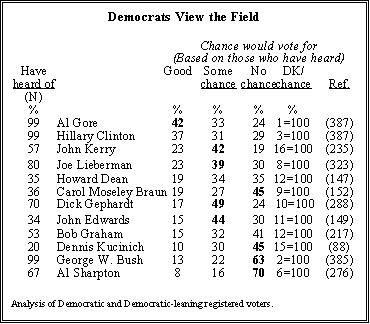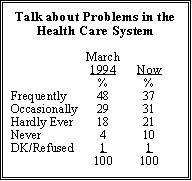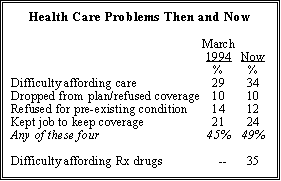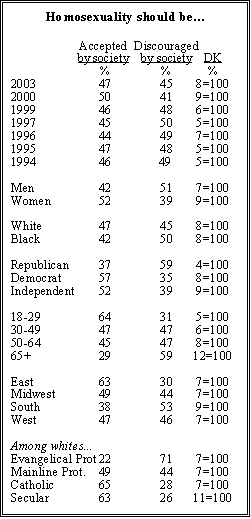Summary of Findings
As presidential campaign activities start to pick up steam, President Bush is facing increasing public criticism of his efforts to deal with domestic issues and greater wariness of the military situation in Iraq. At the same time, his potential Democratic rivals show little early appeal and the Democratic party has lost significant ground on health care, an issue on which the party has pinned great hopes for 2004.
 Discontent with President Bush’s efforts to revive the economy has risen sharply, from 53% in May to 62% in the current survey. In addition, fully seven-in-ten (72%) believe the president is not making a strong enough effort to deal with growing health care problems in this country. Bush’s overall job performance rating of 60% is down 14 points from its post-Iraq war peak (74%).
Discontent with President Bush’s efforts to revive the economy has risen sharply, from 53% in May to 62% in the current survey. In addition, fully seven-in-ten (72%) believe the president is not making a strong enough effort to deal with growing health care problems in this country. Bush’s overall job performance rating of 60% is down 14 points from its post-Iraq war peak (74%).
Americans also are taking an increasingly negative view of the U.S. military operation in Iraq. Fewer than a quarter (23%) say the U.S. military effort there is going “very well,” far fewer than the percentage who expressed that view throughout the war. Despite this growing concern, two-thirds (66%) favor a major U.S. commitment to rebuild Iraq and establish a stable government there. About the same number (67%) continue to back the decision to go to war in Iraq, down slightly from early and mid-April (74%).
There are no signs that the public’s unease over developments at home and abroad are providing the Democrats with much political momentum. In fact, the Democratic Party is losing its historic advantage over the Republicans on health care. By 38%-31%, the public favors the Democrats as the party best able to reform the health care system. That is the smallest edge the Democrats have held on this measure since October 1994 (41%-34%), after the demise of the Clinton administration’s controversial national health care proposal.
Changing partisan evaluations come at time when somewhat more Americans report having trouble paying for health care costs than was the case in the mid-1990s. Nearly half of all Americans (49%) say they have experienced problems with affording health care or maintaining health insurance coverage, up from 45% in 1994.
 The latest nationwide poll of 1,201 Americans by the Pew Research Center finds tempered enthusiasm for a Bush second term; 63% say there is a “good” or “some” chance they will vote for the president next fall. That is somewhat less than the number who said they would consider voting for then-Gov. Bush in June 1999 (69%), mostly because views of Bush have become much more polarized politically. But the field of Democratic candidates generates much less interest than did the field of candidates four years ago. So far, none of the nine candidates gets a majority saying they would consider voting for them (among voters familiar with the candidates). The same is true for non-candidates Al Gore and Sen. Hillary Clinton.
The latest nationwide poll of 1,201 Americans by the Pew Research Center finds tempered enthusiasm for a Bush second term; 63% say there is a “good” or “some” chance they will vote for the president next fall. That is somewhat less than the number who said they would consider voting for then-Gov. Bush in June 1999 (69%), mostly because views of Bush have become much more polarized politically. But the field of Democratic candidates generates much less interest than did the field of candidates four years ago. So far, none of the nine candidates gets a majority saying they would consider voting for them (among voters familiar with the candidates). The same is true for non-candidates Al Gore and Sen. Hillary Clinton.
Four years ago, candidates in both parties attracted far more voter interest. On the Republican side, solid majorities said there was at least some chance they would vote for Bush (69%), Elizabeth Dole (61%), and Sen. John McCain (55%), who had relatively little name recognition at the time. Among Democrats, majorities said they would consider voting for Gore and former Sen. Bill Bradley, who also was not very well known (54% Gore, 53% Bradley).
The current survey finds little in the way of Clinton nostalgia. Bill Clinton’s presidency continues to divide the public about half (49%) say he will be remembered as one of the “very best” presidents or at least better than most, while nearly the same number (46%) believe history’s judgment will not be favorable. That division has persisted since 1999. And despite brisk sales for Hillary Clinton’s memoirs, fewer than one-in-ten (8%) say they are very closely following news reports on the book, which is by far the lowest interest measured for any story this month.
Evaluations of Military Effort Decline
The ongoing violence in Iraq and rising number of U.S. casualties have taken a toll on public perceptions of the military conflict. Not only do fewer than a quarter of Americans (23%) have a very positive impression of how things are going, but nearly as many (21%) say the military operation is not going well. During the war, no more than 10% took a negative view of the military situation in Iraq.
 Perceptions of the military effort, as well overall attitudes toward Iraq, remain highly partisan. Nearly twice as many Republicans as Democrats say the military effort is going very well (34% vs. 18%). But members of both parties have a far less positive impression of progress in the military operation than they did in the war’s final phase (April 8-16). At that point, 77% of Republicans and 47% of Democrats said the military effort was going very well.
Perceptions of the military effort, as well overall attitudes toward Iraq, remain highly partisan. Nearly twice as many Republicans as Democrats say the military effort is going very well (34% vs. 18%). But members of both parties have a far less positive impression of progress in the military operation than they did in the war’s final phase (April 8-16). At that point, 77% of Republicans and 47% of Democrats said the military effort was going very well.
Two-thirds of Americans (67%) think it was the right decision to go to war in Iraq, down somewhat from the end of the war (74%). Roughly nine-in-ten Republicans (88%) continue to back that decision, compared with fewer than half of Democrats (48%), down from 59% in the April 8-16 survey.
There is less partisan division over a U.S. commitment to rebuild Iraq. Majorities of Republicans (76%) and Democrats (60%) support a major American effort to rebuild Iraq and establish a stable government there. But only about half (47%) of those who think things are currently going poorly in Iraq (a group that is mostly comprised of Democrats and independents) favors a major U.S. commitment to rebuild the country, compared with nearly three-quarters (74%) of those who say things are going very well or fairly well.
No Democratic Frontrunner
 At this early stage of the presidential campaign, name recognition is crucially important. Sen. Joe Lieberman and Rep. Dick Gephardt are the best known candidates, among all voters as well as among Democrats and those who lean Democratic (80% of Democratic voters say they have heard of Lieberman, 70% Gephardt). But none of the Democratic candidates garners a level of enthusiasm that sets them apart from the field.
At this early stage of the presidential campaign, name recognition is crucially important. Sen. Joe Lieberman and Rep. Dick Gephardt are the best known candidates, among all voters as well as among Democrats and those who lean Democratic (80% of Democratic voters say they have heard of Lieberman, 70% Gephardt). But none of the Democratic candidates garners a level of enthusiasm that sets them apart from the field.
Gephardt, Sen. John Kerry and Lieberman have the most potential support among Democratic voters. Two-thirds (66%) of those who have heard of Gephardt say they would consider voting for him. Kerry and Lieberman receive comparable levels of support (65% and 62%, respectively).
While Sen. John Edwards is less familiar, 59% of Democratic voters who have heard of Edwards say there is at least some chance they would vote for him. Slightly fewer say the same about Howard Dean (53%), Sen. Bob Graham (47%) and Carol Moseley Braun (46%).
In addition to being known by just 20% of Democrats, Rep. Dennis Kucinich’s appeal is also narrower than most other candidates more say there is no chance they would vote for him (45%) as say there is a chance (40%). Al Sharpton is far more familiar (67% know his name), but has even more limited appeal. Fully 70% of Democrats say there is no chance they would vote for Sharpton, more than say this about George W. Bush.
Non-Candidates: Gore and Clinton
Al Gore, who declared late last year that he would not be a candidate in 2004, attracts the most potential support among Democrats. Three-quarters of Democrats say there is at least some chance they would vote for Gore, and 42% say there is a good chance they would vote for the former vice president. Gore drew comparable interest among Democrats four years ago. In June 1999, 78% of Democratic voters said they would consider voting for Gore.
Roughly two-thirds of Democratic voters (68%) say there is at least some chance they would vote for Sen. Hillary Clinton, who also has indicated she is not running next year. While Gore and Clinton demonstrate strength among Democrats, both continue to be polarizing political figures. When the views of all voters are considered, eight-in-ten Republicans (82%) and about half of independents (47%) say there is no chance they would vote for Gore. Slightly more Republicans and independents have ruled out voting for Sen. Clinton (84% of Republicans, 55% of independents).
No Clinton Nostalgia
The public remains evenly divided in its assessment of President Bill Clinton’s performance while in office, and this view has remained unchanged over the past four years. Overall, 49% say he will be remembered as either one of the “very best” presidents (14%) or “better than most” (35%), while 46% say he will turn out to be “not as good as most” (28%) or “definitely worse than most” (18%).
These current views of Clinton’s presidency are virtually identical to measures taken in surveys dating back to 1999, indicating that the public’s perceptions of Clinton were locked in before he left office. And not surprisingly, there is a sharp partisan and racial gap in evaluations of the Clinton presidency. Three-quarters of Democrats (76%) believe Clinton will be regarded at least as one of the better presidents, while about as many Republicans (75%) think his performance was sub-par. And while most whites (54%) think Clinton was not as good as or worse than most others, fully 87% of blacks believe Clinton was better than most (43%) or one of the very best (44%) presidents.
No Decline in Health Care Problems
 The survey finds nearly four-in-ten (37%) saying that the topic of problems in the health care system comes up frequently in conversations with family and friends, and another 31% say they talk about it occasionally. (This survey was largely completed before passage June 27 of legislation providing a prescription drug benefit as part of Medicare.)
The survey finds nearly four-in-ten (37%) saying that the topic of problems in the health care system comes up frequently in conversations with family and friends, and another 31% say they talk about it occasionally. (This survey was largely completed before passage June 27 of legislation providing a prescription drug benefit as part of Medicare.)
This indicator of concern falls somewhat below the levels recorded in March 1994 during the debate over the health care reform proposals of the Clinton administration. At that time, 48% said problems with the system came up frequently in conversations, with another 29% saying they talked about it occasionally.
Even though problems with the health care system are not as topical today as in the midst of discussion about Clinton’s efforts to reform the system in 1994, the number of people reporting individual problems with the system in the past year is at least as high as it was nine years ago. Overall, 49% report they have encountered at least one of four different problems over the past year trouble affording health care, having coverage dropped or denied, or staying in a job just to keep coverage compared with 45% in 1994.
 In addition, 35% of Americans say they have had “great difficulty” paying for prescription drugs, a measure that was not part of the 1994 survey. The more general problem of inability to afford the cost of necessary medical care (34%) is mentioned nearly as often, and is up somewhat compared with 1994 (when 29% cited it). Nearly one-quarter (24%) say they have stayed in a job they did not like just to keep the health insurance coverage (compared with 21% in 1994).
In addition, 35% of Americans say they have had “great difficulty” paying for prescription drugs, a measure that was not part of the 1994 survey. The more general problem of inability to afford the cost of necessary medical care (34%) is mentioned nearly as often, and is up somewhat compared with 1994 (when 29% cited it). Nearly one-quarter (24%) say they have stayed in a job they did not like just to keep the health insurance coverage (compared with 21% in 1994).
Other problems included being refused coverage because of preexisting conditions (12%) and being dropped from or refused coverage by a plan (10%). The percentage of people who report keeping a job just to maintain coverage and who say they have been refused coverage has not declined in the past nine years, despite enactment in 1996 of a law aimed at making it easier for people who change jobs to maintain their health insurance.
More Blacks Report Problems
While problems with the health care system have increased modestly compared with eight years ago, the most notable change since 1994 is which Americans report troubles with the system. African-Americans, Democrats and people with annual household incomes of below $30,000 are now much more likely to say they are experiencing such problems.
Notably, nearly seven-in-ten African-Americans (69%) now say they are experiencing at least one of four problems related to paying for and maintaining health coverage (difficulty affording health care, refused coverage, refused because of pre-existing condition, or stayed at a job to maintain coverage). In 1994, fewer than half of African-Americans reported at least one of these problems (46%).
 By comparison, the percentage of whites who report experiencing problems with the health care system has not increased significantly since 1994 (46% now, 44% then).
By comparison, the percentage of whites who report experiencing problems with the health care system has not increased significantly since 1994 (46% now, 44% then).
Affording health care, in particular, has become a more prevalent problem among African-Americans. In 1994, blacks were only four percentage points more likely than whites to say they had great difficulty affording needed care (33% for blacks, 29% for whites). Today the gap is 21% (53% for blacks, 32% for whites).
The racial differences contribute to a political gap in the number reporting problems with the health care system. In 1994, Democrats and Republicans reported similar experiences: overall, 39% of Republicans and 46% of Democrats had at least one problem. Today, there is a much bigger difference: 41% of Republicans report at least one problem, but 58% of Democrats do. The change is especially notable in difficulty affording health care: 26% of Republicans and 30% of Democrats reported this problem in 1994; today, 28% of Republicans and 40% of Democrats say they have trouble affording care.
As was the case in 1994, Americans age 65 and older are far less likely to report problems with the health care system than are younger Americans. Roughly a third of seniors (32%) say they have experienced one or more problems with the system, compared with majorities in other age groups. And just a quarter of seniors report trouble affording general health care costs, compared with 36% of people under age 65.
In addition, people age 65 and older are no more likely than younger Americans to report problems in affording prescription drugs. About three-in-ten seniors (31%) say they have had great difficulty in affording prescription drugs in the past year. That compares with 36% of those under age 65.
Modest Dem Edge on Reforming Health Care
Despite President Bush’s strong push for the new Medicare prescription drug benefit, 72% of the public say he could be doing more to deal with health care problems in America. While Democrats (at 88%) overwhelmingly feel this way, even a majority of Republicans agree (52%). Although most seniors think the president could be doing more, they are not as negative as younger Americans are about his effort on the issue: 32% of those age 65 and older say he is doing enough, compared with 20% of those younger than 65.
Yet the Democratic party is not benefitting from the concerns of the public on this issue. The poll finds that the Democrats hold only a slight edge over the Republicans as the party the public trusts to reform the U.S. health care system: 38% pick the Democrats, 31% pick the Republicans. During the 1990s, Democrats typically posted much larger leads on this issue. In September 1998, 43% preferred Democrats to reform the health care system, compared with 31% who favored Republicans. Democrats and Republicans overwhelmingly favor their own party on the issue, while independents favor the Democratic party by 32%-22%.
Little Change in Views on Homosexuality
The public remains divided over whether homosexuality should be accepted by society. While 47% say homosexuality is “a way of life that should be accepted by society,” nearly as many (45%) believe that it is a way of life that “should be discouraged by society.” (This question was asked as part of separate survey of 1,000 Americans, conducted June 4-8, which will be released later this summer.)
Attitudes on this issue have changed little in recent years. Since 1994, between 46% and 50% of Americans have supported societal acceptance of homosexuality. Opposition to that view has ranged from 50% (in 1997) to 41% in 2000.
 There are major religious, political and demographic differences in these attitudes. Nearly two-thirds of Catholics (65%) and almost half of white mainline Protestants (49%) support societal acceptance of homosexuality compared with just 22% of white evangelical Protestants. Majorities of Democrats (57%) and independents (52%) believe society should accept homosexuality, but only 37% of Republicans agree.
There are major religious, political and demographic differences in these attitudes. Nearly two-thirds of Catholics (65%) and almost half of white mainline Protestants (49%) support societal acceptance of homosexuality compared with just 22% of white evangelical Protestants. Majorities of Democrats (57%) and independents (52%) believe society should accept homosexuality, but only 37% of Republicans agree.
Age also is a significant factor in opinion on homosexuality. Nearly two-thirds of Americans (64%) under 30 endorse societal acceptance of homosexuality; fewer than half in other age groups agree. Among those age 65 and older, nearly twice as many say society should discourage homosexuality as believe it should be accepted (57% vs. 29%).
Iraq Again Tops News Index
Public interest in developments in Iraq has declined somewhat since June, but that story continues to lead the news interest index. Nearly four-in-ten Americans (37%) say they followed news about Iraq very closely, down from 46% in June. In May, 63% of Americans paid very close attention to news reports about Iraq.
Nearly three-in-ten (28%) paid very close attention to a related story the controversy over the failure to find weapons of mass destruction in Iraq. About as many Americans (27%) followed reports on violence between Israelis and Palestinians.
About one-in-five Americans (22%) followed news on the murder of Laci Peterson very closely. Interest in that story has declined since May, when 31% followed that case very closely. And just 8% of Americans paid very close attention to the publication of Sen. Clinton’s memoirs. Even among Democrats, this attracted by far the lowest level interest of any story this month (13% very closely). Republicans and independents showed even less interest (6% of Republicans, 5% of independents).


